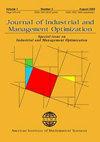A framework for treating model uncertainty in the asset liability management problem
IF 1.6
4区 工程技术
Q3 ENGINEERING, MULTIDISCIPLINARY
引用次数: 1
Abstract
The problem of asset liability management (ALM) is a classic problem of the financial mathematics and of great interest for the banking institutions and insurance companies. Several formulations of this problem under various model settings have been studied under the Mean-Variance (MV) principle perspective. In this paper, the ALM problem is revisited under the context of model uncertainty in the one-stage framework. In practice, uncertainty issues appear to several aspects of the problem, e.g. liability process characteristics, market conditions, inflation rates, inside information effects, etc. A framework relying on the notion of the Wasserstein barycenter is presented which is able to treat robustly this type of ambiguities by appropriate handling the various information sources (models) and appropriately reformulating the relevant decision making problem. The proposed framework can be applied to a number of different model settings leading to the selection of investment portfolios that remain robust to the various uncertainties appearing in the market. The paper is concluded with a numerical experiment for a static version of the ALM problem, employing standard modelling approaches, illustrating the capabilities of the proposed method with very satisfactory results in retrieving the true optimal strategy even in high noise cases.资产负债管理问题中模型不确定性的处理框架
资产负债管理问题是金融数学中的一个经典问题,也是银行机构和保险公司非常感兴趣的问题。在均值-方差(MV)原理的视角下,研究了该问题在不同模型设置下的几种表述。本文在单阶段框架下,在模型不确定性的背景下,重新研究了ALM问题。在实践中,不确定性问题出现在问题的几个方面,如负债过程特征、市场条件、通货膨胀率、内幕信息效应等。提出了一个基于Wasserstein重心概念的框架,该框架能够通过适当处理各种信息源(模型)和适当地重新制定相关决策问题来稳健地处理这种类型的模糊性。所提出的框架可以应用于许多不同的模型设置,从而选择对市场中出现的各种不确定性保持稳健的投资组合。最后,采用标准建模方法对静态版本的ALM问题进行了数值实验,结果表明,即使在高噪声情况下,所提出的方法也能很好地检索出真正的最优策略。
本文章由计算机程序翻译,如有差异,请以英文原文为准。
求助全文
约1分钟内获得全文
求助全文
来源期刊
CiteScore
2.50
自引率
15.40%
发文量
207
审稿时长
18 months
期刊介绍:
JIMO is an international journal devoted to publishing peer-reviewed, high quality, original papers on the non-trivial interplay between numerical optimization methods and practically significant problems in industry or management so as to achieve superior design, planning and/or operation. Its objective is to promote collaboration between optimization specialists, industrial practitioners and management scientists so that important practical industrial and management problems can be addressed by the use of appropriate, recent advanced optimization techniques.

 求助内容:
求助内容: 应助结果提醒方式:
应助结果提醒方式:


